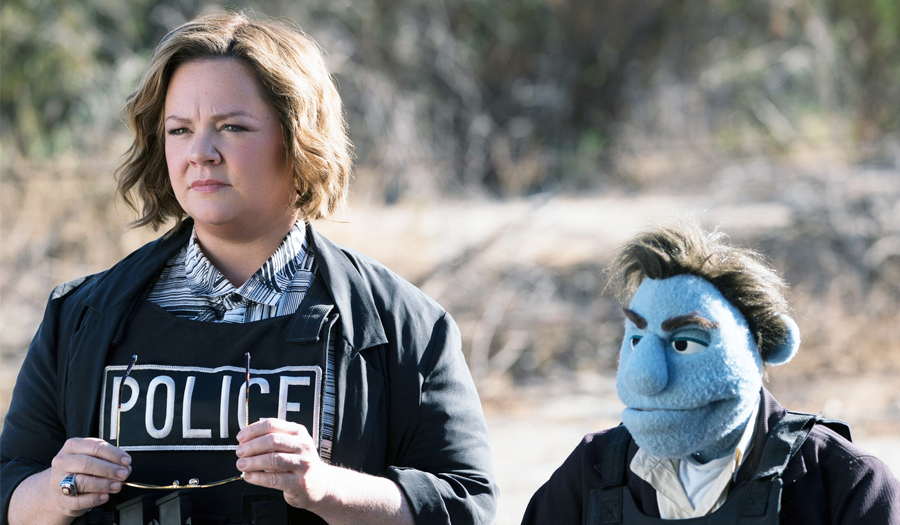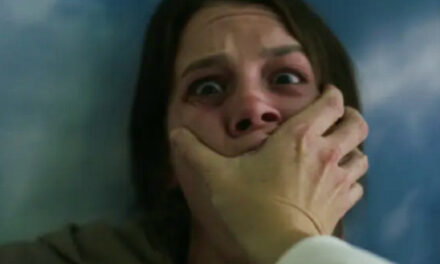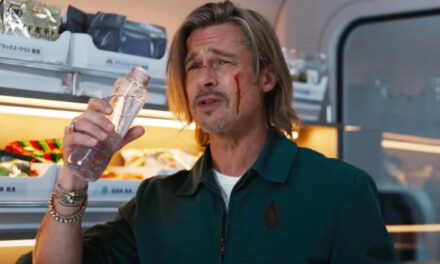
The Happytime Murders (**) R
Movies about naughty puppets aren’t really anything new or a revolutionary concept of any sort. A good example of this sort of thing would be an early film from Peter Jackson entitled Meet the Feebles, released in 1989 and now almost totally forgotten after Mr. Jackson’s subsequent successes adapting the literary properties of JRR Tolkien to the big screen. Feebles was a subversively funny film, albeit not for all tastes, featuring a plot mimicking the same one found on The Muppet Show. The exception was the characters found in Jackson’s film included a fly who feasted on waste, human and otherwise, and a sexually promiscuous turtle showing all the symptoms of the AIDS virus, to name only two of examples of what was on display.
Much ado has been made in the press in the weeks leading up to the release of The Happytime Murders regarding its cast of misbehaving puppets. It is worth noting that there is one thing making this new naughty puppet movie somewhat noteworthy in that it was directed by Brian Henson, the son of the legendary Muppets’ creator Jim Henson. As such, there’s an air of desperation hanging over the proceedings. As if the younger Henson was so desperate to do something different that he didn’t bother to actually invest in a story that was worth the effort. The Happytime Murders is anything but a good example of this sort of thing done well.
Melissa McCarthy & Phil in ‘Happytime’
Melissa McCarthy, in her second misstep in just a few months, is Connie Edwards, a police detective whose former puppet partner, Phil Phillips (Bill Baretta providing the voice) becomes witness to a murder. The two are reunited in their attempts to solve the case and along the way the audience gets to see plenty of graphic depictions of puppets doing things that you won’t see on Sesame Street. Unfortunately, the humor doesn’t come off as clever but rather forced and generally unfunny. It’s the kind of thing that elicits a chuckle every now and then but nothing more.
There is a lame attempt to cram in a social statement with a subplot involving puppets being the victims of discrimination, but that comes across as heavy handed and as forced as the humor in the film. It never comes together in a way that the ads lead you to believe. McCarthy does her best and maybe it all looked great on paper. Unfortunately, there is blessed little to enjoy on screen.
Scotty & The Secret History Of Hollywood (***)
The selling point of Scotty and the Secret History of Hollywood is its subject’s willingness to spill the beans and name names regarding Tinseltown legends who, as the press release puts it were, ‘gay, straight and omnivorous.’ This, of course, was at a time when such things were usually kept away from the public eye. The exception being a few under the radar tabloids that would occasionally blurt out an accusation or two if the stars in question didn’t respond to their thinly veiled threats of blackmail.
Scotty Bowers ran a gas station on Hollywood Boulevard after his dismissal from the military in the 1950s and he is the subject of this film. His gas station didn’t cater as much to the fuel tanks of customer’s automobiles as it did the sexual appetites of those celebrity notables who kept their lifestyles secret for fear of losing their ability to earn a living.
Scotty Bowers wrote a tell all book some years back entitled “Full Service” which made a few minor waves in the press regarding its sordid stories recounting the decadent side of the stars of the classic movie era. Filmmaker Matt Tyrnauer was so taken by Bowers’ book that he’s made a movie about his subject that works well enough. Its biggest surprise is that it works not on the level that perhaps the director had intended and more as a study of Bowers’ life.
Scotty Bowers in LA
The stories recounted in the film regarding celebrity sexual exploits are sometimes interesting but most of the information isn’t would one might consider revelatory. The sexual proclivities of many of the names mentioned here isn’t anything new and only those who don’t follow this sort of thing would find many surprises.
What is most interesting is the central character of Scotty Bowers. Bowers owns two homes, one of which he shares with his current wife. He’s now in his mid 90s and pretty spry for someone in that age bracket. Bowers, however, is a classic hoarder and the scenes inside his home as he struggles to do such simple tasks as walking through the clutter are fascinating. One wonders what a field day a psychologist might have if they could get the chance to analyze him.
The film manages to be most emotionally involving when Scotty recounts the losses he’s encountered in his personal life, most notably the deaths of his first wife and his daughter. Those are the stories that make the film most rewarding. Considering that this is a film purporting to expose the dark side of Hollywood it’s a surprise then that the story of Scotty Bowers is more interesting than any of those tales that are told in the film. That was the real revelation for me.
The Happytime Murders is playing around this area. ‘Secret History’ is playing in Charlotte at the Regal Ballantyne Village Stadium, and it is unrated.
Questions or comments? Write Adam at [email protected].








